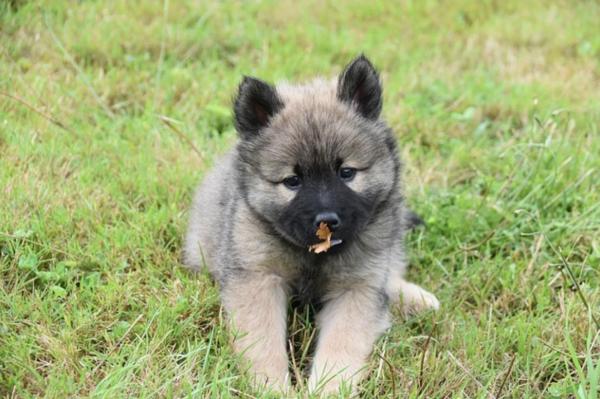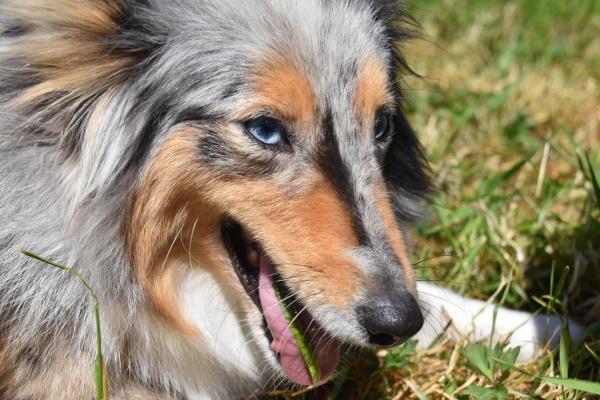My Dog Is Eating Grass But Not Throwing Up



See files for Dogs
You may be aware that dogs will eat grass from time to time and throw up afterwards. It is a common behavior that can occur in healthy dogs, but it is poorly understood. Some animal behaviorists see it as a form of mild pica, where the eating of grass has no specific purpose. Others believe there are physiological reasons for this behavior, most often related to issues with the gastrointestinal tract. It is for this reason dogs will often eat grass and vomit afterwards. They do not do this all the time, with some eating grass and then carrying on their day as normal.
At AnimalWised, we discover why my dog is eating grass, but not throwing up. To understand the potential reasons for this behavior, we need to consider why dogs might eat grass in the first place.
Do dogs eat grass to vomit?
It is common for us to see our dog eating grass, only to vomit it up moments later. Some believe that vomiting is the purpose of eating grass. Graminivores are animals that eat grass as their main source of sustenance. Dogs are facultative carnivores, meaning they derive their main nutrition from animal-based protein, but they have the physiology to eat plant matter.
While vegetables and even some fruits can be part of a healthy diet for dogs, grass is not a suitable foodstuff. Graminivores have specialized digestive tracts to break down the highly fibrous material of grass. Dogs do not have this ability.
Since dogs cannot easily digest grass, it may be for this reason dogs eat it. It can help to clean out their digestive tract by acting as a sort of vegetative pipe cleaner. It can also stimulate the vomiting reflex, allowing the dog to get rid of blockages.
Although grass can help stimulate the vomiting reflex, this is not always the case. Dogs can eat grass without throwing up. The grass will often be present in the stool, although it may be difficult to see, depending on the amount ingested. In this way, it is no more abnormal for a dog to not throw up after eating grass as it is for them to do so.
With this background in mind, we take a look at the reasons why a dog might be eating grass, but not throwing up.
Nutritional deficiencies
Grass-eating behavior in dogs has been studied for many years, but the exact nature of this behavior remains theoretical. This means it is difficult to establish a definitive cause. One of the most popular theories is that it is used as a digestive aid. This theory is based on the observation that dogs often vomit after ingesting grass, suggesting that it acts as a natural emetic.
While this may explain why dogs eat grass and vomit, not vomiting might challenge this theory. However, vomiting is not the only way a dog might use grass as a digestive aid. The dog may be eating grass as a way to compensate for nutritional deficiencies in their diet. One of the most significant is fiber. Since grass is such a fibrous material, it may aid in the dog's gastrointestinal transit. It is also possible grass contains other nutrients the dog craves.
What to do if a dog has nutritional deficiencies
If the reason why a dog eats grass, but doesn't throw up, is due to a nutritional deficiency, we need to review their diet. Dogs need to eat food that is specific to their needs. This means we need to consider age, activity levels, health status and other factors when determining the best diet for a dog.
Poor-quality food or the wrong type of food can lead to nutritional deficiencies in dogs. It is also possible the animal has a health issues which is leading to nutritional deficiency. For this reason, you should take the dog for a veterinary checkup if they are regularly eating grass. They can provide an assessment and run the appropriate tests to determine if they have a specific health reason causing a nutritional deficiency and leading to this behavior.

Treating gastrointestinal disorders
Some scientists believe that the behavior of eating grass and not vomiting may date back to the ancestral heritage of canines. The ancestors of domestic dogs may have fed on grass or plants for various reasons, including the aforementioned induction of vomiting. It is also possible that dogs had a more herbivorous diet in the past, although this is not for certain. Grass could have also been a way to eliminate intestinal parasites or animal remains.
While we know our dog does not eat grass for sustenance, it is possible your dog is eating grass, but not throwing up, due to gastrointestinal upset. If this is the case, we should look at other potential symptoms such as vomiting or diarrhea in the dog. This upset can be caused by eating spoiled food, intestinal parasites, infection, intestinal blockage or other diseases.
What to do if a dog has gastrointestinal disorders
Some mild gastrointestinal disorders in dogs will relive themselves on their own. It is possible that grass eating is sufficient to treat the problem. If symptoms such as diarrhea persist more than 24-48 hours, then you will need to take them to a veterinarian. They will assess the dog and run diagnostic tests to determine the problem. An example is taking an x-ray to see if there is a blockage or testing a stool sample for intestinal parasites in dogs.
They enjoy eating grass
Many dogs seem to eat grass without vomiting afterwards simply because they like the taste. Fresh grass may be attractive to them and eating it can be a form of exploration or play.
What to do if a dog eats grass for no reason
If your dog carries out this behavior simply because they enjoy it, you may not need to do anything. If they eat small amounts of grass occasionally and do not throw up, it shouldn't cause any significant health problem. Only if they eat it all the time might it cause issues such intestinal blockage. This is something serious which can lead to gastric torsion in dogs which is potentially fatal.
We also need to be careful what other substances our dog eats with the grass. If the grass has pesticides, is near sewage or has any other contaminant, we need to remove access from our dog. Make sure the grass your dog has access to is safe and free of harmful substances.

Boredom or stress
We have explained the potential physiological reasons why a dog is eating grass, but not throwing up. Psychological sources of this behavior are also possible. In these cases, boredom or stress are often the underlying cause. Dogs which are not sufficiently stimulated physically or mentally can develop behavioral problems, perhaps eating grass out of sheer boredom.
Dogs that have experienced trauma, have been poorly educated or lack of socialization may also develop behavioral problems due to stress or anxiety. Stressful experiences can also precipitate abnormal behaviors. In this case, it is possible the eating of grass is a form of obsessive compulsive behavior in dogs.
What to do if my dog is stressed
If our dog is eating grass due to boredom, we need to ensure we provide the correct level of stimulation. For some dogs, this will mean taking them out for more regular physical exercise. For others, it will require a greater amount of cognitive stimulation such as training and education.
If a dog is stressed, we will need to determine the underlying cause of the stress. We can then eliminate it from their lives or address it with behavioral therapy. This might include improving their socialization or amending their education. For help with this process, you may need to see a canine ethologist. They can best assess their individual situation and provide specific advice.
As we can see, there are various reasons why a dog eats grass, but doesn't throw up. In these cases, there may be no significant issue. When they only eat small amounts occasionally, we can see it as part of their normal behavior. Only when a dog eats grass compulsively or shows other signs of illness will we need to address the behavior. Regularly veterinary checkups and suitable preventive medicine should be provided to all dogs.

If you want to read similar articles to My Dog Is Eating Grass But Not Throwing Up, we recommend you visit our Behavioral problems category.







